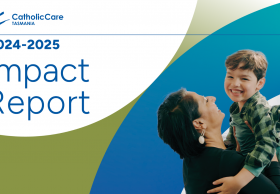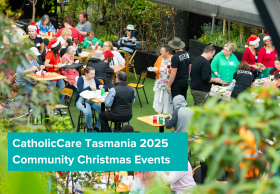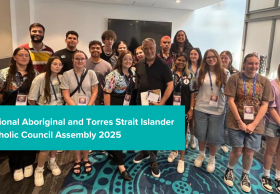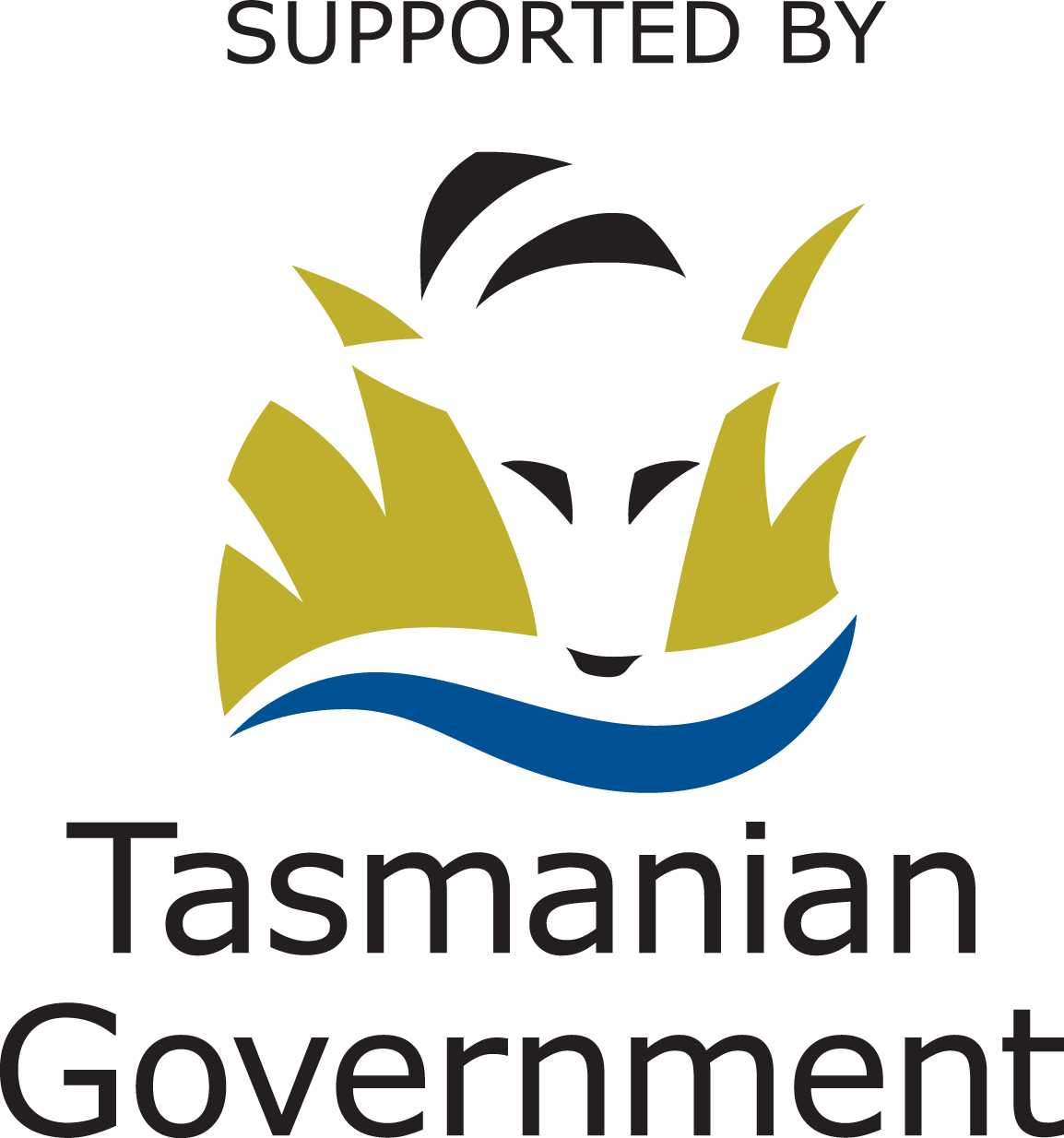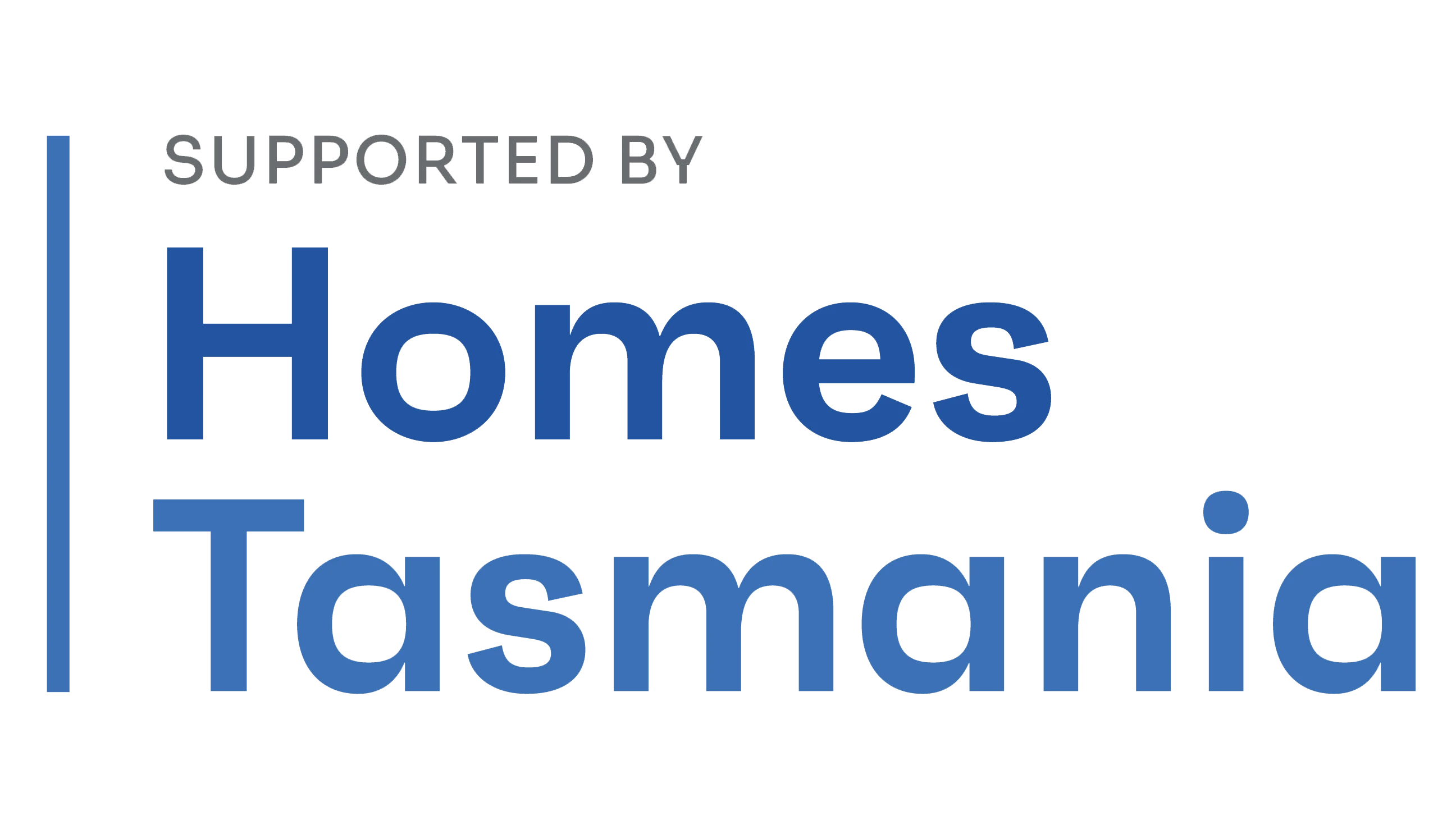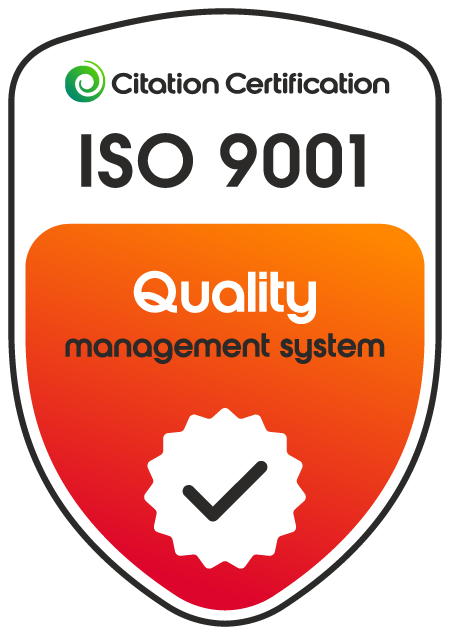High toll of homelessness crisis
The gruelling toll of homelessness was laid bare at a CatholicCare Tasmania event in Launceston marking the start of Homelessness Week 2022.
One mother of four revealed how she and her family returned to Tasmania after fleeing domestic violence interstate. They were homeless for two and a half years, at times sleeping in their car, as they were rejected for more than 400 private rentals.
The working mum with ‘a perfect rental history’ revealed: “We moved 12 times in 19 months. My children attended five different schools in three states.”
This took a toll on the mother’s mental health.
“My mental health suffered severely,” she said. “I cannot even begin to explain the depression that came from 320-plus [unsuccessful] housing applications in [another state] and 120 applications in Tasmania.
“I kept asking, what was I doing wrong? I wasn’t doing anything wrong. We are in the middle of a housing crisis. It is nothing to be ashamed of.”
Eventually, with the assistance of CatholicCare Tasmania, the family was allocated transitional housing, which she described with relief as ‘a godsend’ but they will still need to find a permanent home after that.
“Australia is in the midst of a housing and homelessness crisis,” she said. “I want people to understand that homelessness can affect anybody, and it does effect everybody.”
She called for the affordability rate for private rentals to be ‘severely looked at’; more consideration given to converting abandoned buildings and old hotels and pubs into hostel accommodation; expanded or additional women’s shelters; and more support staff to assist people fleeing domestic violence.
Another Launceston single mother, Sarah, spoke of her traumatic times living in several different rentals around Launceston. In the midst of this, her own health deteriorated and sadly, her school-age son died. Sarah returned to live with her mother for five years, until her mother needed to sell the house.
Sarah’s housing situation improved when she was allocated a housing support worker through CatholicCare Tasmania.
“She was lovely, and I immediately felt a little better just meeting someone face to face and having a chat,” Sarah said.
“I told her about my situation, and she told me about a transitional property… I cried in the office in front of her, I was so relieved. I wouldn't have to sleep in my car and things were starting to look up…
“Months and months went by, and it really opened my eyes into just how rough the housing situation is. My support worker from CatholicCare kept in touch regularly, and I just had to play the waiting game. It was hard on me mentally seeing other tenants move in and out as they found permanent homes…
“A year after being in emergency accommodation, I was offered a place in a wonderful suburb … It was perfect. I was so happy.”
The Minister for State Development, Construction and Housing, Guy Barnett, praised the courage of those who had shared their experiences with homelessness. He also thanked CatholicCare and other service providers for their ‘awesome’ care and support of clients experiencing homelessness.
“Drug and alcohol abuse, mental health illness, domestic violence, family breakdown, financial vulnerability – all of these things can impact on a family member, on a friend, on a neighbour, on a fellow Tasmanian,” he said.
“Our aim is to rid Tasmania of homelessness but that is going to be a long-term objective… [We] do have a big plan [to provide] more housing but the plan is for the here and now as well, to provide wrap-around services in terms of drug and alcohol support, addiction support, mental health support.
“It is not just a roof over someone’s head. It is a whole lot more than that. We have heard the complex stories this morning that requires a multi-faceted response: not just state government, but local government, federal government and the community working together in partnership to get the job done to care for each other.”
Deputy Premier Michael Ferguson also attended the event as an observer.
“In a time of housing shortage, [it is important to] promote services and additional housing supply that will actually assist people who are either in desperate situations or uncertain situations and making sure that we do provide wrap-around care at all levels of homelessness,” he said.
About 70 people from multiple service providers, the real estate industry and state and local government attended the event at the Launceston Town Hall on Monday, 1 August. It was organised by CatholicCare Tasmania Housing Connect Support to mark Homelessness Week 2022.
Nic, team leader for CatholicCare Tasmania’s Housing Connect Support, North and North-West said the key message of Homelessness Week is that is homelessness can happen to anybody.
“We as an organisation are very privileged to offer support to people in their time of need,” he said.
“The key support, via Housing Connect, is advice and information and referrals to appropriate services.”
The incidence of homelessness was revealed in statistics shared at the Launceston Town Hall event. According to figures from the Federal Government’s Australian Institute of Health and Welfare, for 2021, on any given day across Tasmania:
- 58 specialist homelessness services agencies were supporting almost 2,100 clients;
- 509 of these clients were young people presenting alone and 240 were children in families that were being supported;
- 8 clients received support for the first time;
- 287 spent the night sleeping in crisis accommodation;
- 410 people report having slept rough in the past month;
- 46 requests for assistance were unable to be met; and,
- Support agencies close 13 cases with 64 per cent having stable housing outcomes.
Other news you may be interested in
High toll of homelessness crisis
The gruelling toll of homelessness was laid bare at a CatholicCare Tasmania event in Launceston marking the start of Homelessness Week 2022.
One mother of four revealed how she and her family returned to Tasmania after fleeing domestic violence interstate. They were homeless for two and a half years, at times sleeping in their car, as they were rejected for more than 400 private rentals.
The working mum with ‘a perfect rental history’ revealed: “We moved 12 times in 19 months. My children attended five different schools in three states.”
This took a toll on the mother’s mental health.
“My mental health suffered severely,” she said. “I cannot even begin to explain the depression that came from 320-plus [unsuccessful] housing applications in [another state] and 120 applications in Tasmania.
“I kept asking, what was I doing wrong? I wasn’t doing anything wrong. We are in the middle of a housing crisis. It is nothing to be ashamed of.”
Eventually, with the assistance of CatholicCare Tasmania, the family was allocated transitional housing, which she described with relief as ‘a godsend’ but they will still need to find a permanent home after that.
“Australia is in the midst of a housing and homelessness crisis,” she said. “I want people to understand that homelessness can affect anybody, and it does effect everybody.”
She called for the affordability rate for private rentals to be ‘severely looked at’; more consideration given to converting abandoned buildings and old hotels and pubs into hostel accommodation; expanded or additional women’s shelters; and more support staff to assist people fleeing domestic violence.
Another Launceston single mother, Sarah, spoke of her traumatic times living in several different rentals around Launceston. In the midst of this, her own health deteriorated and sadly, her school-age son died. Sarah returned to live with her mother for five years, until her mother needed to sell the house.
Sarah’s housing situation improved when she was allocated a housing support worker through CatholicCare Tasmania.
“She was lovely, and I immediately felt a little better just meeting someone face to face and having a chat,” Sarah said.
“I told her about my situation, and she told me about a transitional property… I cried in the office in front of her, I was so relieved. I wouldn't have to sleep in my car and things were starting to look up…
“Months and months went by, and it really opened my eyes into just how rough the housing situation is. My support worker from CatholicCare kept in touch regularly, and I just had to play the waiting game. It was hard on me mentally seeing other tenants move in and out as they found permanent homes…
“A year after being in emergency accommodation, I was offered a place in a wonderful suburb … It was perfect. I was so happy.”
The Minister for State Development, Construction and Housing, Guy Barnett, praised the courage of those who had shared their experiences with homelessness. He also thanked CatholicCare and other service providers for their ‘awesome’ care and support of clients experiencing homelessness.
“Drug and alcohol abuse, mental health illness, domestic violence, family breakdown, financial vulnerability – all of these things can impact on a family member, on a friend, on a neighbour, on a fellow Tasmanian,” he said.
“Our aim is to rid Tasmania of homelessness but that is going to be a long-term objective… [We] do have a big plan [to provide] more housing but the plan is for the here and now as well, to provide wrap-around services in terms of drug and alcohol support, addiction support, mental health support.
“It is not just a roof over someone’s head. It is a whole lot more than that. We have heard the complex stories this morning that requires a multi-faceted response: not just state government, but local government, federal government and the community working together in partnership to get the job done to care for each other.”
Deputy Premier Michael Ferguson also attended the event as an observer.
“In a time of housing shortage, [it is important to] promote services and additional housing supply that will actually assist people who are either in desperate situations or uncertain situations and making sure that we do provide wrap-around care at all levels of homelessness,” he said.
About 70 people from multiple service providers, the real estate industry and state and local government attended the event at the Launceston Town Hall on Monday, 1 August. It was organised by CatholicCare Tasmania Housing Connect Support to mark Homelessness Week 2022.
Nic, team leader for CatholicCare Tasmania’s Housing Connect Support, North and North-West said the key message of Homelessness Week is that is homelessness can happen to anybody.
“We as an organisation are very privileged to offer support to people in their time of need,” he said.
“The key support, via Housing Connect, is advice and information and referrals to appropriate services.”
The incidence of homelessness was revealed in statistics shared at the Launceston Town Hall event. According to figures from the Federal Government’s Australian Institute of Health and Welfare, for 2021, on any given day across Tasmania:
- 58 specialist homelessness services agencies were supporting almost 2,100 clients;
- 509 of these clients were young people presenting alone and 240 were children in families that were being supported;
- 8 clients received support for the first time;
- 287 spent the night sleeping in crisis accommodation;
- 410 people report having slept rough in the past month;
- 46 requests for assistance were unable to be met; and,
- Support agencies close 13 cases with 64 per cent having stable housing outcomes.
Other news you may be interested in
Other news

